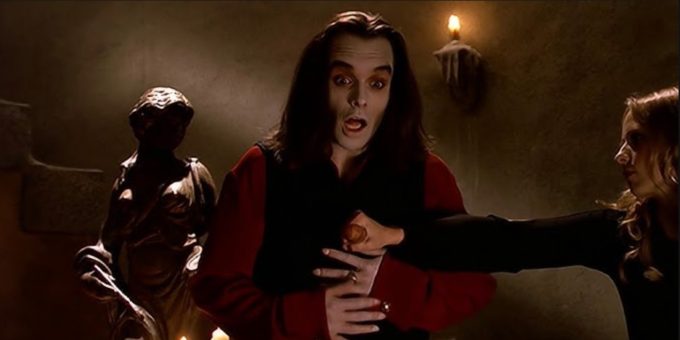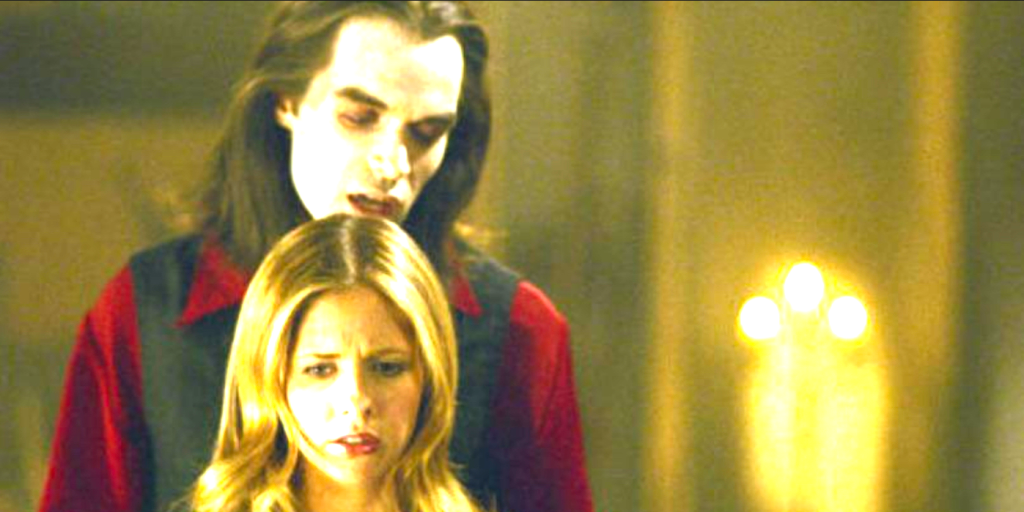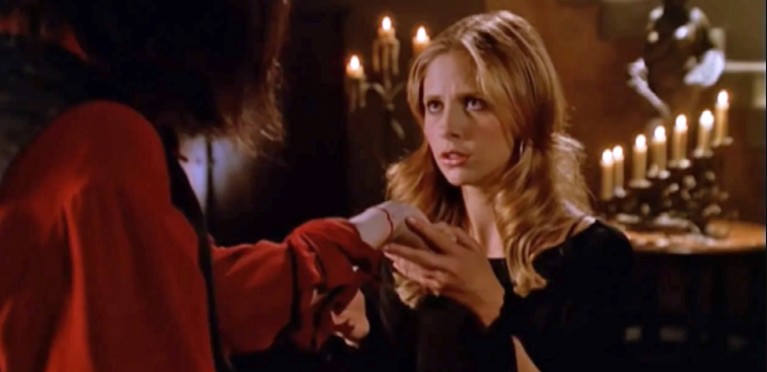
“Buffy vs. Dracula” – Revisiting Buffy’s Subversive Dracula Episode 25 Years Later
“Your power is rooted in darkness. You must feel it.”
“No. You know what I feel? Bored.”
This article contains heavy spoilers for 2024’s Nosferatu and Season 5 of Buffy the Vampire Slayer.
Society has been telling vampire stories for over a century, whether it’s the austere gothic horror of Bram Stoker’s 1897 novel, Dracula, ore palatable and playful stories, like the Twilight series and The Vampire Diaries, or something in between, such as Fright Night or The Lost Boys. Robert Eggers’ Nosferatu harkens back to the vampire’s vicious roots and his interpretation of F. W. Muranau‘s 1992 original became one of 2024’s biggest horror movies and it’s still going strong. Nosferatu is dark, disturbing, and dedicated to its craft, yet among all the dread and despondency us a surprisingly feminist vampire tale. Lily-Rose Depp’s Ellen Hutter spends most of Nosferatu being stalked, manipulated, and chained up, yet she still possesses incredible power – although it’s not fully understood, even by herself. Nosferatu’s slant on this story is as stimulating as it is scary. However, there’s another take on Dracula from 25 years earlier that presents a similar story that’s even more subversive and empowering. Buffy the Vampire Slayer’s “Buffy vs. Dracula,” written by Marti Noxon and directed by David Solomon, used Dracula to help Sarah Michelle Gellar’s Buffy Summers better understand herself, her power, and her role as a feminist icon.
Every Buffy season is transformative and challenging, but season five is especially revelatory for the Slayer. Buffy gains a sister, loses a mother, and grapples with several different identity crises, all while she prepares for battle against a literal God. Buffy’s fifth season is frequently regarded as not only one of the series’ best years, bit one of the most impressive seasons out of any of Joss Whedon’s productions. It’s a masterpiece in serialized storytelling that doesn’t just sublimely connect all the season’s dots, but brings together several ideas and themes that have been present since Buffy the Vampire Slayer’s start. Buffy’s season premieres are typically heavy, introspective experiences, so audiences were understandably caught off-guard with season five’s Buffy vs. Dracula.” This season premiere is just as deep as its predecessors and it elegantly sets up broaded questions about Buffy’s identity and the Slayer’s role in society, yet this is regarded as one of Buffy’s most polarizing entries because of its cavalier approach to Dracula (Rudolf Martin) and the episode’s oddly comical slant. Even the title “Buffy vs. Dracula” is very tongue-in-cheek and undervuts the episode’s serious subject matter. The only thing more farcical would be if it were titled “Buffy and the Scooby Gang Meet Dracula!”
“Buffy vs. Dracula” is admittedly tonally dissimilar from many Buffy episodes. It even starts with Buffy and her friends goofing around on a sunny beach. However, Buffy is very careful not to make Dracula himself a joke. He triggers comical events, such as Buffy’s starstruck demeanor, Xander’s insect-eating fealty, and Spike’s petty grudged with the vampire and how he’s made life more difficult for his own kind, but Dracula himself is deathly serious. Dracula instead feels like he’s out of a completely different series. He talks in flowery gothic prose instead of witty Whedon-speak one-liners. The only “funny” things he does is the mist materialization gag that ends the episode, but een that is largely comical because of Buffy’s reaction to it. Much of Buffy’s fifth season involves an altered reality that dark monks have created for sinister purposes. It almost feels like Dracula is a byproduct of this alternate universe and that he’s a vestige of Bram Stoker’s nvel who’s been plucked out and dropped in Sunnydale.

Buffy the Vampire Slayer uses Dracula to tell a personal story that connects to Buffy’s ongoing evolution. That being said, it’s still entertaining to see this thought-provoking episode indulge in many of the classic Dracula tropes, not unlike Eggers’ Nosferatu. “Buffy vs. Dracula” gives Dracula additional vampire powers that aren’t typically explored in the series, such as his ability to turn into a bat, a wolf, and weaponize a hypnotic thrawl on others. Xander fulfills the Renfield role and becomes the episode’s central comic relief, while Giles becomes Buffy’s resident Jonathan Harker and temporarily loses himself to a trio of vampire brides. These are details that stand out most when “Buffy vs. Dracula” is broken down purely on a story level and they’re fun Dracula fan service. However, these touches aren’t really important or what the episode is actually about.
It’s easy to get lost in Xander’s funny fealty and the ways in which Dracula ruffles everyone’s feathers. Beyond this silliness, some of the most compelling material to come out of “Buffy vs, Dracula” involves how the Dark Prince prods Buffy regarding her power. Curiously, Dracula doesn’t minimize Buffy’s strength, but instead tells her that she could be even more magnificent if she became his vampiric bride. This material would fall flat if it were to happen in Buffy’s first or second seasons, but it hits with greater intensity five years in. Nobody expects Buffy to become a vampire by the end of the episode, but it;’s a heavier proposition for Buffy. On some level, after everything that she’s experienced, it feels as if there is some level of temptation to just escape in this immortal fantasy. She can’t and she won’t. but Dracula comes along at the perfect time when he’s actually able to get in Buffy’s head and have her question herslelf. This makes it all the more significant that Buffy could be some infamous Vampire Queen and thrive through killing, but she instead choose to be humanity’s thankless protector. It’s a powerful theme that courses through the season and reaches a devastating breaking point in the season’s finale, where Buffy makes the ultimate sacrifice.
In a deleted scene from “Buffy vs. Dracula,” Dracula goes even further with this level of dissection. “I know intimately what it is to be different,” he tells Buffy. “Human, but not quite. Of the world, but still an outsider. You see? We understand each other. Both of us are born of darkness, masters in the art of death.” Count Orlok (Bill Skarsgård) echoes a comparable line in Nosferatu when he tells Ellen. “Love is inferior to you. I told you, you are not of humankind.” Buffy and Ellen both buy into their dark tempter’s words, but it’s an empowering message to Buffy and an imprisoning one to Ellen. Buffy spends an entire season grappling with how she’s a “master in the art of death,” which pushes her down a dark path – one that’s not always healthy for her – but one that’s traveled on her own volition. Dracula’s words may literally echo in Buffy’s head in “Buffy vs. Dracula” as he hypnotizes her through their blood bond. However, it’s merely the seed of suggestion that eats away at her doubts through the rest of the season.

Buffy and Dracula’s final confrontation turns into a battle of will as Buffy asserts herself against Dracula’s hold over her and the dark life that he promises. Buffy does drink Dracula’s blood, but it’s a legacy of Slayer strength that brings her back to her senses and gives her the power to persevere. It’s not just Buffy’s strength that overpowers the Dark Prince, but generations of female-driven Slayer confidence that defeats this predatory threat. Ellen may be doomed to perish in Nosferatu and become a cautionary tale. Alternatively, Buffy, is able to channel past cautionary tales and failed promises to become an inspirational anomaly.
“Buffy vs. Dracula” explores the idea that the Slayer’s reputation is just as prominent to vampires as Dracula’s is to humans. Dracula explicitly comes to Sunnydale because he’s heard repeated tales of Buffy’s incredible accomplishments. When the dust – or rather the mist – settles here, Buffy is the one who is left standing and in the position of power. Five years of Slayer duties trumps centuries of dark acts. Buffy doesn’t just survive this experience, but she’s left invigorated and eager to learn more about the history of the Slayers and the full extent of what her privileged role represents. She wants to create a bright future for herself, and others, by building a legacy that’s even more prolific than that of Dracula.
Vampire stories like Nosferatu and “Buffy vs. Dracula” are dense in darkness not just visually, but as a force that’s emblematic of what Ellen and Buffy are fighting against. These vampire narratives are tonally extreme, yet they explore very similar dialogue on this topic. At one point in Nosferatu, Anna Harding asks Ellen, “What is this insufferable darkness?” During another, Ellen questions, “My dreams grow darker… Tell me, does evil come from within us? Or beyond?” The latter of these statements is more or less the ongoing mantra for Buffy’s fifth season as Buffy attempts to get to the center of the Slayers, but also herself. Buffy also repeatedly subverts the idea of darkness and the power that it holds. At one point, Buffy boasts to Dracula, “How do you like my darkness now?” It’s a powerful, purifying asset to her, rather than a totally corrupting force. Even earlier, Dracula tells Buffy. “Your power is rooted in darkness. You must feel it,” while an unphased Buffy retorts, “No. You know what I feel? Bored.” Darkness may control Dracula, Count Orlok, and Ellen, but not Buffy.

Robert Eggers has spoken candidly about how Depp’s Ellen possesses a unique understanding of the “shadow side of the world” and that this dark gift is not just misunderstood – but persecuted – in her world. It’s hard to not draw parallels here between Ellen and Buffy, both of whom are forced to work through a world that needs them, yet doesn’t have the right tools to celebrate them. They’re forced to suffer and sacrifice. Buffy is blessed enough to have a better support system, but she still faces astronomical hurdles that are too much to overcome.
Buffy may not perish at Dracula’s hands, but she still meets her end in a similar fashion to Ellen. Part of the reason that Ellen ultimately “submits” to Orlok and sacrifices herself to take him out is that she feels that she doesn’t belong in a world that’s progressively moved away from magic. Ellen feels that she doesn’t fit in and is an aberration, which on many levels aligns with Buffy’s decision to sacrifice herself to save the world when this soul-searching season reaches its end. The message that Buffy carries with her for over a season – “your gift is death” – is ultimately empowering. However, it still concludes with Buffy cold and underground.
Both Buffy and Ellen’s fates are regarded as morose losses for the greater good, yet it’s only Buffy that features what one might consider to be a happy ending. It’s hard to imagine Ellen with a gravestone epitaph that’s a fraction as congratulatory as Buffy Summers’ headstone. Robert Eggers’ Nosferatu and Buffy the Vampire Slayer’s “Buffy vs. Dracula” both transform the classic vampire figure into a catalyst for feminist growth and self-discovery. However, Buffy is the one that does more with this revelation and channels it into an entire season of challenging character development that proves that a girl is strong enough to not just defeat Dracula, but a God.
Original article at BLOODYDisgusting.
This article has been re-produced for archive purposes, all rights remain with the original website.







